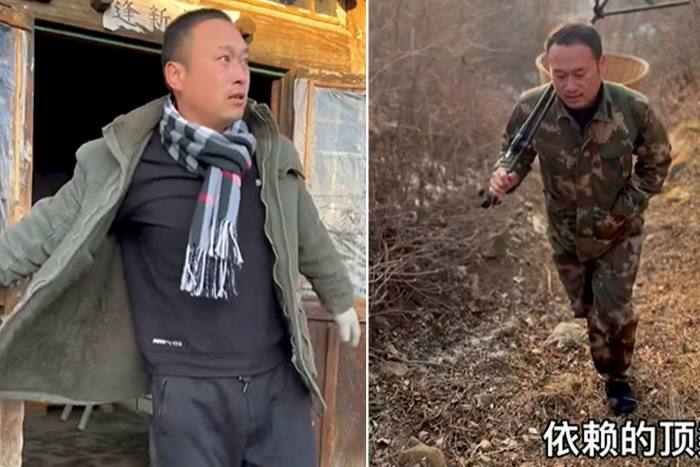China’s social media influencers play safe with wholesome content
Wang Jing’s hand dives into a mound of soil and pulls out a bulging bunch of oyster mushrooms. “Look how pretty they are,” the mushroom-farmer-turned-influencer says to her fans on Douyin, the Chinese version of the short-video platform TikTok, as she strokes the soft caps of the fungi.
Wang is one of the many internet stars whose wholesome and educational content is taking up more space on Chinese social media, after censors have scrubbed out content promoting lifestyles deemed to be out of line with the Chinese Communist party’s socialist values.
The country’s internet watchdog, the Cyberspace Administration of China (CAC), has this year taken down 20,000 influencer or wanghong accounts for “disseminating misguided content and polluting the internet environment”.
After President Xi Jinping became leader of the Communist party in 2012, clampdowns on online political speech limited what netizens could post. But Beijing’s efforts to orchestrate tighter control over online culture has increased since Xi iterated the “common prosperity” drive in August, to narrow the country’s large wealth gap.
Since then, censors have cast a wider net to catch unwanted accounts, and content that would easily have passed censors a year ago is quietly being taken down. Over the past few months, fan pages for Korean boy bands have been suspended, social media posts promoting luxury fashion products have been erased and financial gurus have been banned from handing out investment recommendations over video livestream.
Cara Wallis, a professor at Texas A&M University whose work focuses on Chinese digital media, said internet celebrities “are playing it safe, no one wants to be censored — but as a result, their content has become a bit bland”.
The accounts of many Chinese celebrities are filled with odes to the government and evidence of their charitable endeavours. Zhang Yixing, a Chinese rapper who goes by the stage name Lay, even hosted an online quiz for his fans on the history of the CCP.
“The government wants more positive voices on Chinese social media, which tell a good story about the country,” said a Chinese academic from Guangdong, who researches wanghong culture. Among the approved content makers is Wang Jing, whose videos bring over 2m fans from across China into her small farm in rural Guizhou, one of the poorest provinces in the country. The leading state media broadcaster, CCTV, featured Wang in a news segment about wanghong revitalising rural economies.
The academic, who did not want to share their name publicly, argued that videos casting a favourable view of the country, in the form of patriotic lectures from online celebrities or romantic depictions of the countryside, feed into popular demand: “A lot of people want to see positive videos about China,” they said.
Zhang Tongxue, a countryside Douyin star from the north-east province of Liaoning, has exploded in popularity, gaining more than 17m fans since opening his account in October. He uploads videos of his daily routine layered with the same tropical house-beat song, with shots of him digging for vegetables, gathering firewood and going on adventures with his friends.
Leveraging his newfound popularity, Zhang released a music single called “A Common Person” last week, crooning about the beauty of a “simple” life in the countryside.
Stuart Cunningham, an academic researching Chinese internet culture at the Queensland University of Technology, said the sub-genre of videos depicting rural life is “hugely popular”. “People living in crowded and busy cities in China appreciate the digital connection to rurality, with its serene landscapes and slower pace of life,” he said.

But Cunningham also said the growth of this genre had been orchestrated by government propaganda efforts. Local authorities have hosted wanghong festivals and funded crash courses for budding rural influencers to achieve online fame, in a bid to boost stagnant countryside economies after years of emigration to big cities and under-investment in health and education.
The genre of how-to videos has exploded in popularity on Douyin. In the 12 months to October 2021, plays of educational films increased by 74 per cent, largely driven by the popularity of videos demonstrating how to do practical things — everything from cooking Chinese delicacies to tending to house plants.
Promoting educational content has also been a central focus of Bilibili, a video-sharing website that first became popular with anime and gaming fans.
On that site, Nie Huihua, an economics professor at Renmin University of China, has garnered a relatively modest online following of 155,000 fans for his tutorials analysing the Chinese economy. “It’s a great channel to spread ideas, particularly to students in rural areas who don’t have access to the best teachers,” said Nie. But despite Bilibili’s efforts to promote itself as an educational brand, recruiting top university professors to its platform, Nie said its algorithms were not tailored to identify content with intellectual value.
“Teachers speak in a calm and level manner, but the algorithms promote videos with shocking and controversial titles,” said Nie. The professor said he was not “suited for Bilibili’s recommendation algorithm” but that he would continue to make videos for students to help demystify complex economic theories.
These platforms have to fight for attention by promoting clickbait content while also keeping in line with the online censors, Wallis said. The Chinese academic argued that social media channels were still focused on capturing market share in content streams that generated more advertising revenue, notably gaming and fashion — and that there were still a “diverse” range of influencers — but that they invested politically correct content to curry favour with officials.
For Wang, the motivation to open a Douyin account was economic. She wanted to find a channel with which to reach new buyers for her agricultural products. Over the past year, she has sold about half a million mushroom grow kits to online fans who want to reproduce their own fungi palace.
Wang said her videos matched a desire for educational content about organic produce: “People like my videos because they teach people how to use things that they would usually throw away — corn stalks, maize tassels and rice water — to grow mushrooms.”
Wang said that despite finding unexpected levels of enthusiasm for her oyster mushrooms, there was still a limit to her online reach. “People are interested in rural issues,” she said. “But at the end of the day, lighter entertainment is still more popular.”
Weekly newsletter

Your crucial guide to the billions being made and lost in the world of Asia Tech. A curated menu of exclusive news, crisp analysis, smart data and the latest tech buzz from the FT and Nikkei